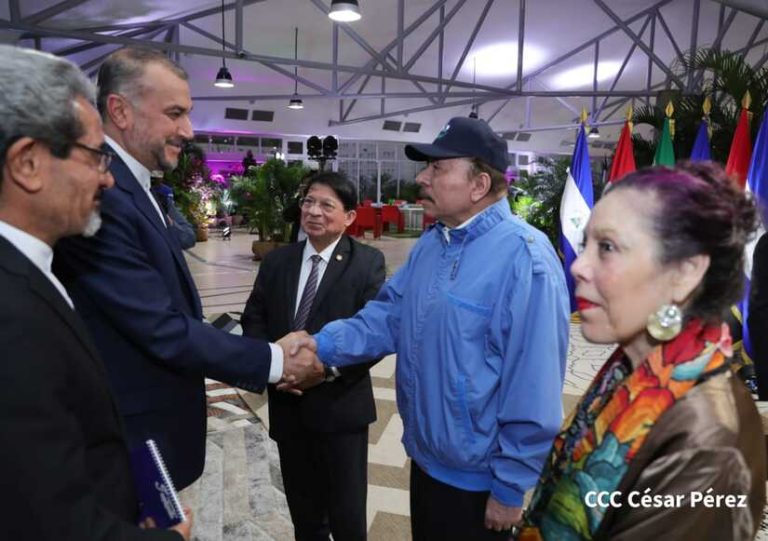19 de abril 2023

Children of Exile: The Births “Sowing Hope” in the Camp of Nicaraguan Farmers

PUBLICIDAD 1M
PUBLICIDAD 4D
PUBLICIDAD 5D
Iranian Foreign Minister Hossein Amir-Abdollahian met with senior officers of the Armed Forces, according to a leak of Pentagon documents.

Los dictadores Daniel Ortega y Rosario Murillo recibieron también al canciller iraní, Hossein Amir-Abdollahian. Foto/Tomado de 19
The Nicaraguan Army explored the possibility of military cooperation with Iran to supposedly "counter U.S. influence in Latin America", revealed an article in the U.S. newspaper The New York Times, which cited a leaked Pentagon document as a source.
According to an intelligence report, Iranian Foreign Minister Hossein Amir-Abdollahian met in February with high-ranking officers of the Nicaraguan Army, who told him that Nicaragua was "opposed to perceived U.S. efforts to expand its influence in Latin America and expressed a willingness to engage with Tehran and other like-minded countries."
The intelligence report is dated February 23, three weeks after Amir-Abdollahian visited Nicaragua, where he held several meetings with senior officials of the Sandinista regime, the children of the presidential couple, and dictators Daniel Ortega and Rosario Murillo.
Official statements about the tour made no mention of the meeting between the military chiefs and the diplomat, highlighting only the promises of economic, trade and energy aid, as well as intense anti-U.S. rhetoric.
During his meeting with the Iranian Foreign Minister, Ortega commented that "in this world it would be appropriate for us all to look for ways to have our own little atomic weapon so that they respect us, because they do show some respect when they know that who they want to crush has an atomic weapon."
"With what authority do they think they can prohibit Iran if it wants to make atomic bombs?" asked Ortega.
On the same visit, Laureano Ortega Murillo, son of the ruling couple, proposed turning Nicaragua into a "platform" for Iran in Central America. "Iran has great technological, industrial, and commercial development, which can greatly benefit Nicaragua, while Nicaragua both has and plays a fundamental role in the Central American region as a platform for the export of products, showcasing Iranian products throughout the Central American region," he said.
The U.S. newspaper highlighted that in recent years, Iran has sought to "strengthen relations with Latin American countries, particularly those it considers to be outside the U.S. sphere of influence" as "Tehran seeks to break the international isolation imposed by Washington and its Western allies."
Over the past few decades, Iran has signed a series of trade agreements with and promised other investments in countries in the region. However, constrained by Tehran's own economic problems, the country has a spotty record of delivering on its promises, according to The New York Times.
Nicaraguan Foreign Minister Denis Moncada Colindres led a diplomatic visit to Iran in December to sign an aid agreement with the Islamic country. Moncada Colindres' visit took place while the Islamic regime was being internationally condemned for public hangings and the killing of more than 400 demonstrators in the context of the protests that broke out in October 2022 after the death, in police custody, of young Mahsa Amini, for allegedly not wearing her hijab correctly.
In May 2022 a high-level Iranian delegation, headed by oil minister Javab Owji, pledged to supply oil derivatives to Nicaragua, assuring Ortega that "together" they could "neutralize aggressions and sanctions." Almost a year later, Iran has not yet come through on that pledge.
In the 1980s, Iran and Nicaragua promoted themselves as "sister revolutions", as both occurred in 1979. However, the anti-imperialist rhetoric never translated into palpable economic cooperation and the unfulfilled promises of Ayatollah Khomeini's regime caused frustration among Sandinista commanders.
The paragraph-long mention of the meeting between the Iranian foreign minister and the Nicaraguan military leaders was included in a series of leaked images posted on a Discord server and provided to The New York Times.
According to the Times, "several U.S. officials, while acknowledging that documents in an earlier series of leaked documents posted on the same server were authentic, cautioned that some had been altered, while others contained outdated or inaccurate information." The Times also reported that it had "described the new batch of documents to several U.S. officials, who neither questioned the information nor confirmed that they were authentic."
U.S. intelligence agencies and the Justice Department are investigating the leak of dozens of documents that refer to several countries. They refer mainly to the military capabilities of Ukraine and Russia, but also mention China, Canada, Turkey, Iran, Israel, Egypt, Haiti and South Korea.
This article was originally published in Spanish in Confidencial and translated by our staff.
PUBLICIDAD 3M
Confidencial es un diario digital nicaragüense, de formato multimedia, fundado por Carlos F. Chamorro en junio de 1996. Inició como un semanario impreso y hoy es un medio de referencia regional con información, análisis, entrevistas, perfiles, reportajes e investigaciones sobre Nicaragua, informando desde el exilio por la persecución política de la dictadura de Daniel Ortega y Rosario Murillo.
PUBLICIDAD 3D